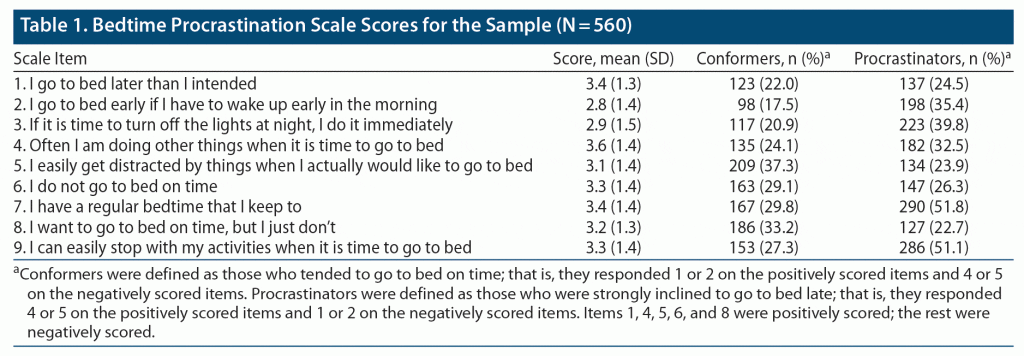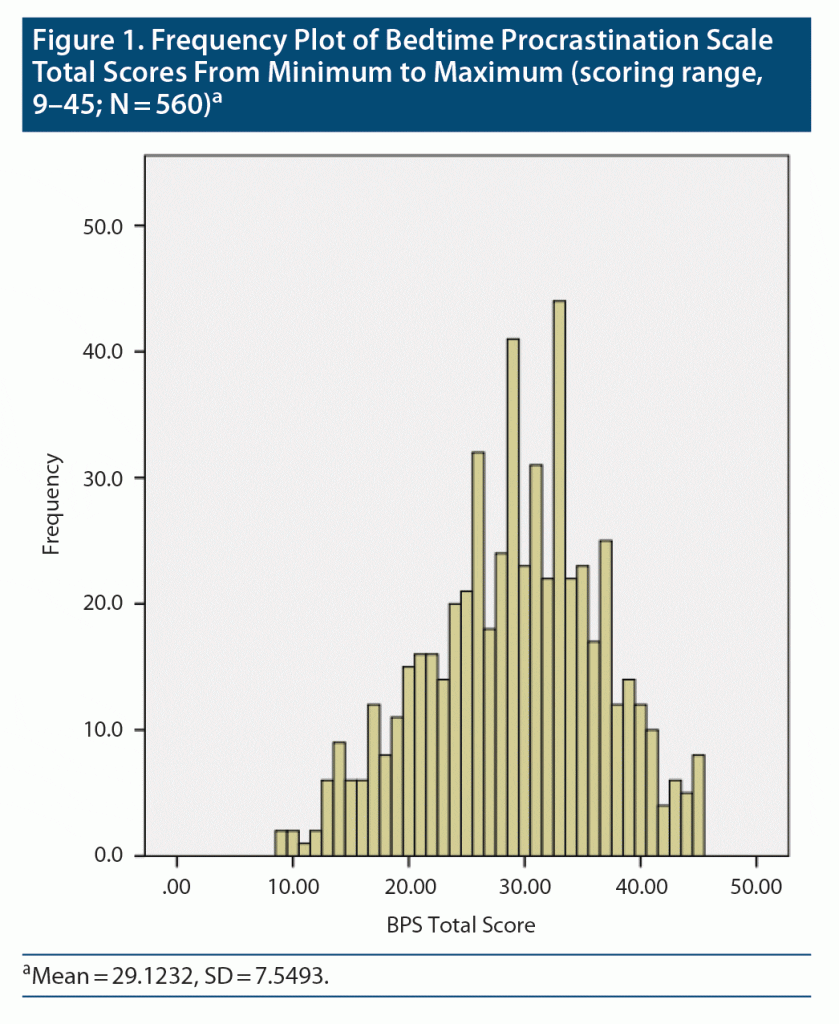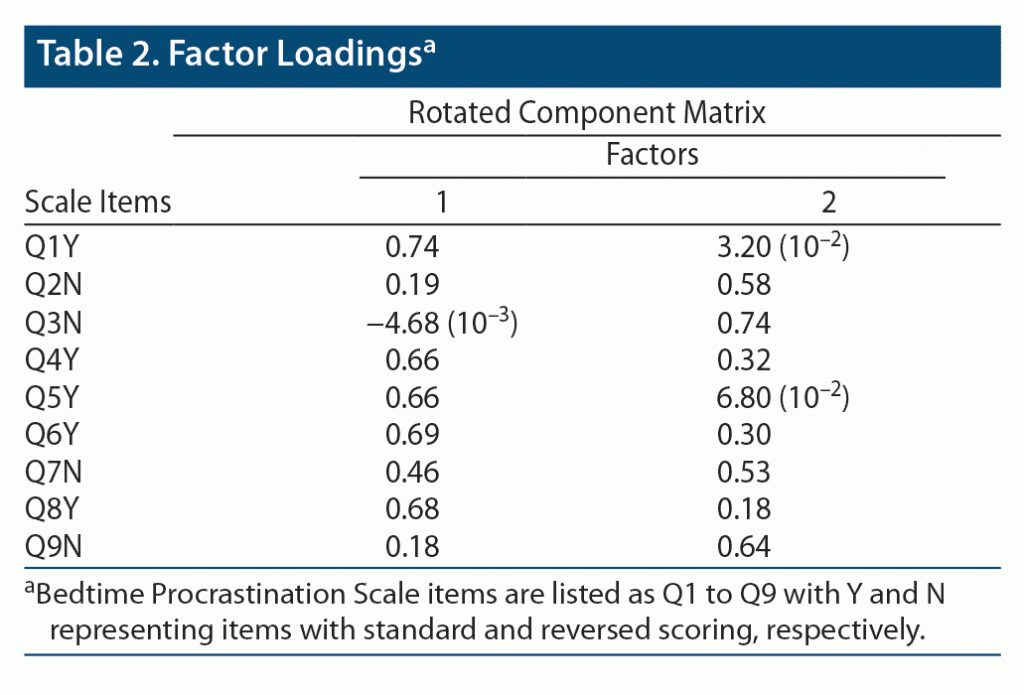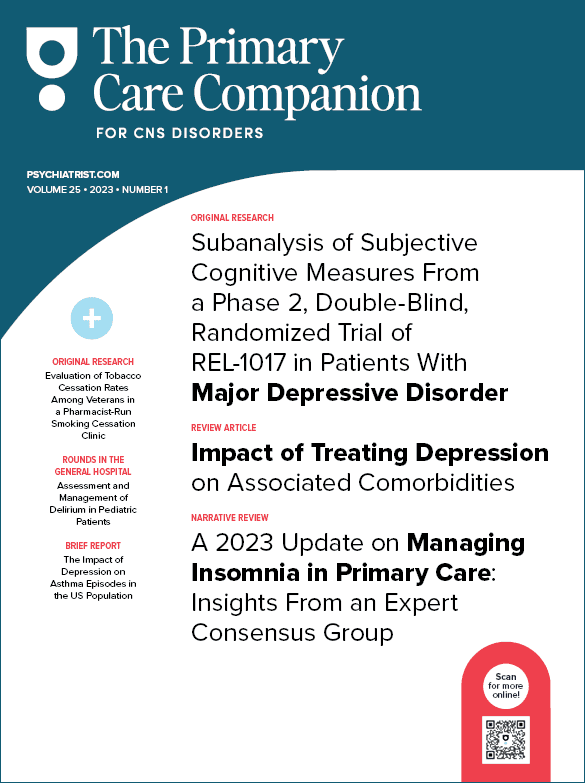ABSTRACT
Objective: To determine the prevalence of bedtime procrastination (BtP) among Indian university students and to evaluate the performance of the Bedtime Procrastination Scale (BPS).
Methods: The BPS (scoring range, 9–45), with separate, additional questions related to sleep and influences thereon, was administered to all on-campus graduate and postgraduate students attending Navrachana University, Gujarat, India. The variable of regular sleep habits was defined as a BPS total score of 9–18 and BtP as a BPS total of 36–45. The BPS was examined using factor analysis. The study was conducted from November 2021 to December 2021.
Results: Completed forms were received from 560 of 567 eligible students. The mean BPS total score was 29.1. BPS total scores did not differ significantly between males and females. Few students (n = 54, 9.6%) had study-defined regular sleep habits. One-fifth of the sample (20.2%) had study-defined BtP. Higher BtP total scores showed a small but statistically significant correlation with daytime tiredness (r = 0.26). Factor analysis of the BPS yielded a 2-factor solution that explained 49.3% of the variance in the data. The latent variables appeared to represent “Going to bed late” and “Going to bed on time.” Potential problems, not previously discussed in the literature, were identified based on the manner in which BPS items were presented and scored.
Conclusions: Few university students have regular sleep habits. BtP is present in a sufficiently large enough proportion of students to be of health concern. The BPS is likely to require modifications for future use.
Prim Care Companion CNS Disord 2023;25(1):22m03334
To cite: Shukla A, Andrade C. Prevalence of bedtime procrastination in university students and reexamination of the Bedtime Procrastination Scale. Prim Care Companion CNS Disord. 2023;25(1):22m03334.
To share: https://doi.org/10.4088/PCC.22m03334
© 2023 Physicians Postgraduate Press, Inc.
aDivision of Biomedical and Life Sciences, School of Sciences, Navrachana University, Vadodara, India
bDepartment of Clinical Psychopharmacology and Neurotoxicology, National Institute of Mental Health and Neurosciences, Bangalore, India
*Corresponding author: Chittaranjan Andrade, MD, Department of Clinical Psychopharmacology and Neurotoxicology, National Institute of Mental Health and Neurosciences, Bangalore 560 029, India ([email protected]).
Sleep is important for the normal functioning of almost all systems of the body. In the short term, poor sleep impairs learning and memory,1 compromises physical and mental performance,2 impairs job performance,3 and increases the risk of accidents.4 In the long term, people who sleep poorly tend to gain weight, develop diabetes and hypertension, and experience ischemic heart disease events.5 In the long term, poor sleep may also increase the risk of Alzheimer’s disease.6
In women, poor sleep can alter menstrual rhythms and predispose to infertility and poor pregnancy and birth outcomes7; in men, poor sleep is associated with decreases in sperm count and sperm motility.8 Poor sleep can trigger inflammation, compromise immunity, and even change the gut microbiome.9,10 Finally, poor sleep may increase the risk of neuropsychiatric disturbances such as anxiety, depression, bipolar episodes, and even breakthrough seizures in epilepsy.11–13
University students represent a population that is particularly vulnerable to poor sleep. The reasons for poor sleep in this population are many. University students have academic targets and deadlines, examinations, and social preoccupations and screentime temptations that delay bedtime. They also may use substances that interfere with normal sleep. A systematic review14 identified 7 studies of insomnia in university students in South Asian countries. The prevalence of insomnia ranged from 35% to 70%; the pooled prevalence was 52%.14
Bedtime procrastination (BtP) is potentially an important cause of poor sleep. Conceptually, BtP means “going to bed later than intended with no important external circumstances preventing the person from doing so.”15 BtP may be observed in adolescents and young adults, and especially students, who do not have fixed routines related to domestic and work-related responsibilities and who may therefore engage in screen-related activities before retiring for the night.
BtP has been studied in students in countries such as Portugal,16 Spain,17 and China18 but has not been studied in the large population of Indian students. Therefore, we conducted a study to identify the magnitude of the problem in a section of Indian students and to determine the factor structure and performance of the Bedtime Procrastination Scale (BPS).15
METHODS
Study Design and Setting
This study was planned as an exploratory, cross-sectional survey of college students attending Navrachana University, Gujarat, India. The study was approved by the research approval committee of the university. Written informed consent was obtained from participants in the survey. The study was conducted from November 2021 to December 2021.
Sample
The sample comprised all male and female students who were pursuing their studies in graduate and postgraduate courses at the university. These students were approached when they had assembled in their respective classrooms. With the permission of the teacher, an announcement was made to the students, the nature and purpose of the survey were explained, and the data collection forms were distributed, completed, and immediately collected.
Assessments
The data collection form was divided into 4 sections. The first section comprised 2 short paragraphs that explained BtP and sought consent for participation in the study. The second section collected sociodemographic information and data on health related to sleep. The third section contained the BPS developed by Kroese et al.15 The scale has 9 items, each of which is scored, without explanatory anchors, in the range of 1 (almost never) to 5 (almost always). Items 2, 3, 7, and 9 on the BPS are reverse scored. Higher scores on the BPS indicate greater BtP. The fourth and last section collected additional information about sleep, as obtained by Kroese et al15 in their study.
The BPS total score ranges from a minimum of 9 to a maximum of 45 points. No population norms are available for the BPS, nor are cutoffs available to define BtP. We therefore sought to determine the usefulness of a score of 9–18 points (an average score of 1 to 2 per item) to define regular bedtime and a score of 36–45 points (an average score of 4 to 5 per item) to define BtP. We considered that, especially in a student population, it is reasonable to accept that occasional to no procrastination defines reasonably regular bedtime and that frequent or invariant procrastination defines BtP.
Statistical Methods
Analyses were largely exploratory, except to the extent stated in the objectives. Descriptive statistics were computed as frequency counts and percentages and as mean (SD) with median and mode where relevant. Means were compared between demographic groups of interest using the independent sample t test. Correlations were obtained using the Pearson product moment procedure. The 9 items of the BPS were examined using factor analysis with varimax rotation and Kaiser normalization, with the eigenvalue set at 1 for factor retention. The α for statistical significance was set at P < .05.
RESULTS
Sample Description
A total of 567 students studying in 23 courses were approached in their classrooms, and completed forms were received from 560 students. Data from these students were analyzed.
The age of the subjects in the sample ranged from 18 to 27 years. The mean (SD) age was 19.8 (1.9) years. The sample was 42.5% male (n = 238). About two-thirds of the students (68%) were halfway through their coursework, and 21.6% were in their final year.
Sleep Patterns and Reasons for Poor Sleep
The sample as a whole reported sleeping for a median of 7 hours a night on weekdays, that they were tired during the day for a median of 3 days a week, and that they had slept too little for a median of 2 days a week. Two-fifths of the sample (n = 230, 41.1%) reported affirmatively to the question “Do you suffer from poor sleep?” A small proportion (n = 43, 7.7%) stated that they suffered from a medical or psychological illness that interferes with sleep. Two-fifths (n = 222, 39.6%) reported the presence of external, environmental, or other factors that may have been interfering with their sleep patterns. These findings suggest that some subjects suffered from poor sleep because of external/environmental factors as well as medical/psychological illness.
Bedtime Procrastination Scale Findings
The BPS data are presented in Table 1. From the table, it is apparent that the mean (SD) data convey little useful information because the average student responded with a score of 3 (midway between responses of never and always) for every item on the scale, implying that there was neither consistent rigidity in retirement to bed nor consistent BtP. Therefore, responses were operationalized as conforming versus procrastinating, as explained in the footnote in Table 1. The data showed that, depending on the BPS item, about 18%–37% of the students conformed to a reasonably regular bedtime and that 23%–52% showed BtP. The highest percentages of bedtime procrastinators emerged in the 4 negatively scored items.
BPS total scores ranged from 9 to 45; that is, from the lowest possible score to the highest possible score. The mean (SD) total score on the BPS was 29.1 (7.6). There were 54 students (9.6%) who scored 9–18 on the BPS and 113 students (20.2%) who scored 36–45. These students did not represent distinct frequency subgroups in the BPS total score distribution (Figure 1), justifying an a priori, pragmatic definition of occasional to no procrastination and regular to invariant procrastination rather than a post hoc identification of such groupings.
Bedtime Procrastination in Subsamples
BPS total scores were examined in subsamples of interest:
(1) There was no significant difference between males (n = 238) and females (n = 322). The mean (SD) BPS total scores were 29.0 (7.5) and 29.2 (7.6), respectively (t = 0.33, df = 558, P = .74).
(2) There was no significant difference between students who were less than halfway through their coursework (n = 381) and students who, by virtue of being in their final year, could be staying up late to meet academic demands (n = 121). The mean (SD) BPS total scores were 28.6 (7.5) and 29.9 (7.0), respectively (t = 1.57, df = 500, P = .12).
(3) There was a small but statistically significant difference between students who reported poor sleep (n = 230) and those who did not (n = 330). The mean (SD) BPS total scores were 31.7 (6.9) and 27.3 (7.5), respectively (t = 7.08, df = 558, P < .001).
(4) There was no significant difference between students who reported medical or psychiatric disorders (n = 43) and students who did not (n = 517). The mean (SD) BPS total scores were 30.2 (6.9) and 29.0 (7.6), respectively (t = 0.94, df = 558, P = .35).
(5) There was a small but statistically significant difference between students who reported external, environmental, or other factors that interfered with sleep (n = 222) and those who did not (n = 338). The mean (SD) BPS total scores were 31.0 (7.5) and 27.9 (7.3), respectively (t = 4.84, df = 558, P < .001).
Correlations
BPS total scores showed small but statistically significant correlations with hours of sleep (r = −0.17), daytime tiredness during the week (r = 0.26), and days with too little sleep (r = 0.36). All P values were < .001.
Factor Analysis
Factor analysis of the 9-item BPS questionnaire yielded a 2-factor solution (Table 2). Factor 1 explained 29.3% of the variance, and factor 2 explained 20.0%. The 2 factors together explained 49.3% of the variance in the response to the BPS.
BPS items 1, 4, 5, 6, and 9 loaded on factor 1 and items 2, 3, 7, and 9 loaded on factor 2 (Table 2). On examination of the items loading on each factor, it appeared that factor 1 represents the latent variable “Going to bed late,” and factor 2 represents the latent variable “Going to bed on time.” Another distinguishing consideration, however, is that factor 1 comprised the items that were scored forward from “almost never” to “almost always,” whereas factor 2 comprised the items that were reverse scored.
DISCUSSION
Undergraduate and postgraduate university students comprise a population that is vulnerable to poor sleep for many reasons, of which BtP is one. BtP in students has mainly been examined in Chinese studies; some data have also been reported from Spain, Portugal, Lebanon, and Poland. There has been no study of BtP from the Indian subcontinent. We used the BPS to study BtP in all students attending classes on campus at a university in western India.
Summary of Main Findings
Students reported that they had slept too little for a median of 2 days a week. Two-fifths of the sample reported poor sleep. However, only 7.7% of the sample had a medical or psychological reason for poor sleep; external causes were the driving force behind poor sleep in the remaining students. Depending on the BPS item, about 18%–37% of students conformed to a reasonably regular bedtime, and 23%–52% showed BtP. Examination of the BPS total score revealed that 10% of the sample had a study-defined regular bedtime and 20% had study-defined BtP. No previous study, to the best of our knowledge, has operationalized the BPS to define the prevalence of regular bedtime and BtP as in our study. BPS total scores were unrelated to sample demographics.
The importance of good sleep for physical and mental health was discussed in an earlier section of this article. As in our study, BtP, unsurprisingly, was found by other authors to be associated with indices of poor sleep. For example, Ma et al19 found that BtP predicted both prevalence and severity of poor sleep. In this context, Zhang and Wu20 and You et al21 both found that BtP mediated the relationship between internet addiction and poor sleep. Beyond its effect on sleep, BtP has been associated with mood disturbances. For example, Geng et al22 found that BtP mediated the relationship between smartphone addiction and mood disturbance, especially in students with low self-control. Guo et al23 reported that BtP independently predicted self-reported depression.
Findings of the Factor Analysis
Kroese et al15 identified a single-factor solution. Their sample was smaller (n = 177) and was derived from an internet survey—a method of sampling that is potentially problematic.24 However, other studies with better sampling procedures also identified a single-factor solution, including a study from Spain17 and one from Poland.25
We identified a 2-factor solution. An examination of the items loading on the 2 factors suggested that factor 1 represents the latent variable “Going to bed late” and factor 2 represents the latent variable “Going to bed on time.” However, the 2 factors explained only 49% of the variance in the data; that is, the latent variables in the BPS do not adequately capture the behavior of BtP in Indian university students. In this regard, the single-factor solution obtained by Herzog-Krzywoszanska and Krzywoszanski25 also explained only 48% of the variance in the data.
Observations About the BPS
In the factor analysis, factor 1 comprised the 5 items that were scored forward from “almost never” to “almost always,” and factor 2 comprised the 4 items that were reverse scored. This finding suggests the possibility that the factor loadings were an artifact of how the students understood, interpreted, and responded to the items that required reverse scoring. The reverse-scored items were scattered throughout the scale, and this mixing would require a back-and-forth shift in mental set that could be problematic for students whose medium of instruction is English but whose mother tongue is a different language. If this is true, then errors in response can be prevented by presenting the forward- and reverse-scored questions in separate sections rather than mixed together.
Not all the items in the BPS were well thought out. For example, item 7 on the scale is “I have a regular bedtime which I keep to.” For whatever reason, students may or may not have a regular bedtime, and they may or may not keep to that; this allows for 4 combinations of possibilities, making interpretation of and response to the item difficult. The next item on the scale, “I want to go to bed on time, but I just don’t,” is also problematic for the same reason; it assumes, without justification, that all students want to go to bed on time.
When these observations are taken together, we believe that the BPS requires revision for use in India and that such a revised version may be more useful for global use than the original version. Factor analysis of a revised BPS may yield a solution that explains a greater percentage of the variance in the data, improving the validity of the scale.
Strengths and Limitations
A strength of our study was the large sample size with complete data obtained from almost the entire university campus. We also used an operationalization of the BtP total score to define regular sleep habits and BtP; no other studies have used a similar approach. A limitation of our study is that we did not examine causes of BtP (such as screen addiction) and medical and psychological consequences of BtP. Ours was a preliminary study that was epidemiologic in nature and that sought to test the BPS in Indian students.
Conclusion
Internet and smartphone addiction are important causes of BtP,20,22 but other possible causes have been identified, such as disturbed mood, poor self-regulation, poor self-control, personality characteristics, and other variables,18,22,26,27 and these merit examination in future studies. BtP is common among students in India and across the world. BtP needs to be identified and addressed to treat proximal causes such as disturbed mood and to prevent adverse consequences related to poor sleep.
It could be informative to differentiate BtP from while-in-bed procrastination, as suggested by Magalhães et al.16 BtP is a more general behavior. The individual may delay going to sleep for any reason and in any part of the home. While-in-bed procrastination is a subset of BtP. The individual may, for example, watch movies or engage in social media activity and delay the attempt to fall asleep while already in bed. BtP and while-in-bed procrastination are complex behaviors, and attempts to address them will need to start with public health education, as many procrastinators, especially youth, may not even realize or accept that the behavior is a health concern.
As a final note, whereas we sought to examine the magnitude of the problem of BtP in urban university students in India, it could be interesting to study sociological variations in the prevalence of BtP. For example, one would expect the prevalence to be lower in rural settings and in lower socioeconomic strata because of lower availability of electronic devices, screens, and private sleeping places.
Submitted: June 7, 2022; accepted August 9, 2022.
Published online: February 28, 2023.
Relevant financial relationships: None.
Funding/support: None.
Clinical Points
- Although good sleep is an important mediator of physical and mental health, many youth postpone going to bed.
- Two-fifths of the Indian university student sample reported poor sleep, and one-fifth had study-defined bedtime procrastination.
- The Bedtime Procrastination Scale may require revision to improve its validity.
References (27)

- Hoedlmoser K, Peigneux P, Rauchs G. Recent advances in memory consolidation and information processing during sleep. J Sleep Res. 2022;31(4):e13607. PubMed CrossRef
- Charest J, Grandner MA. Sleep and athletic performance: impacts on physical performance, mental performance, injury risk and recovery, and mental health. Sleep Med Clin. 2020;15(1):41–57. PubMed CrossRef
- Deng Y, Cherian J, Kumari K, et al. Impact of sleep deprivation on job performance of working mothers: mediating effect of workplace deviance. Int J Environ Res Public Health. 2022;19(7):3799. PubMed CrossRef
- Owens J. Adolescent Sleep Working Group; Committee on Adolescence. Insufficient sleep in adolescents and young adults: an update on causes and consequences. Pediatrics. 2014;134(3):e921–e932. PubMed CrossRef
- Grandner MA, Alfonso-Miller P, Fernandez-Mendoza J, et al. Sleep: important considerations for the prevention of cardiovascular disease. Curr Opin Cardiol. 2016;31(5):551–565. PubMed CrossRef
- Falter A, Van Den Bossche MJA. How non-rapid eye movement sleep and Alzheimer pathology are linked. World J Psychiatry. 2021;11(11):1027–1038. PubMed CrossRef
- Willis SK, Hatch EE, Wise LA. Sleep and female reproduction. Curr Opin Obstet Gynecol. 2019;31(4):222–227. PubMed CrossRef
- Chen HG, Sun B, Chen YJ, et al. Sleep duration and quality in relation to semen quality in healthy men screened as potential sperm donors. Environ Int. 2020;135:105368. PubMed CrossRef
- Irwin MR, Opp MR. Sleep health: reciprocal regulation of sleep and innate immunity. Neuropsychopharmacology. 2017;42(1):129–155. PubMed CrossRef
- Han M, Yuan S, Zhang J. The interplay between sleep and gut microbiota. Brain Res Bull. 2022;180:131–146. PubMed CrossRef
- Asarnow LD, Mirchandaney R. Sleep and mood disorders among youth. Child Adolesc Psychiatr Clin N Am. 2021;30(1):251–268. PubMed CrossRef
- Macêdo PJOM, Oliveira PS, Foldvary-Schaefer N, et al. Insomnia in people with epilepsy: a review of insomnia prevalence, risk factors and associations with epilepsy-related factors. Epilepsy Res. 2017;135:158–167. PubMed CrossRef
- Pigeon WR, Bishop TM, Krueger KM. Insomnia as a precipitating factor in new onset mental illness: a systematic review of recent findings. Curr Psychiatry Rep. 2017;19(8):44. PubMed CrossRef
- Chowdhury AI, Ghosh S, Hasan MF, et al. Prevalence of insomnia among university students in South Asian Region: a systematic review of studies. J Prev Med Hyg. 2021;61(4):E525–E529. PubMed
- Kroese FM, De Ridder DT, Evers C, et al. Bedtime procrastination: introducing a new area of procrastination. Front Psychol. 2014;5:611. PubMed CrossRef
- Magalhães P, Cruz V, Teixeira S, et al. An exploratory study on sleep procrastination: bedtime vs while-in-bed procrastination. Int J Environ Res Public Health. 2020;17(16):5892. PubMed CrossRef
- Brando-Garrido C, Montes-Hidalgo J, Limonero JT, et al. Spanish version of the Bedtime Procrastination Scale: cross-cultural adaptation and psychometric evaluation in a sample of nursing students. Psychol Rep. 2022;125(3):1765–1779. PubMed CrossRef
- Chen D, Zhang Y, Lin J, et al. Factors influencing bedtime procrastination in junior college nursing students: a cross-sectional study. BMC Nurs. 2022;21(1):97. PubMed CrossRef
- Ma X, Meng D, Zhu L, et al. Bedtime procrastination predicts the prevalence and severity of poor sleep quality of Chinese undergraduate students. J Am Coll Health. 2022;70(4):1104–1111. PubMed CrossRef
- Zhang MX, Wu AMS. Effects of smartphone addiction on sleep quality among Chinese university students: the mediating role of self-regulation and bedtime procrastination. Addict Behav. 2020;111:106552. PubMed CrossRef
- You Z, Mei W, Ye N, et al. Mediating effects of rumination and bedtime procrastination on the relationship between Internet addiction and poor sleep quality. J Behav Addict. 2020;9(4):1002–1010. PubMed CrossRef
- Geng Y, Gu J, Wang J, et al. Smartphone addiction and depression, anxiety: the role of bedtime procrastination and self-control. J Affect Disord. 2021;293:415–421. PubMed CrossRef
- Guo J, Meng D, Ma X, et al. The impact of bedtime procrastination on depression symptoms in Chinese medical students. Sleep Breath. 2020;24(3):1247–1255. PubMed CrossRef
- Andrade C. The limitations of online surveys. Indian J Psychol Med. 2020;42(6):575–576. PubMed CrossRef
- Herzog-Krzywoszanska R, Krzywoszanski L. Bedtime procrastination, sleep-related behaviors, and demographic factors in an online survey on a Polish sample. Front Neurosci. 2019;13:963. PubMed CrossRef
- Zhang C, Meng D, Zhu L, et al. The effect of trait anxiety on bedtime procrastination: the mediating role of self-control [published online ahead of print April 22, 2022]. Int J Behav Med. 2022. PubMed CrossRef
- Zhao Y, Meng D, Ma X, et al. Examining the relationship between bedtime procrastination and personality traits in Chinese college students: the mediating role of self-regulation skills. J Am Coll Health. 2022:1–7. PubMed CrossRef
Enjoy free PDF downloads as part of your membership!
Save
Cite
Advertisement
GAM ID: sidebar-top







